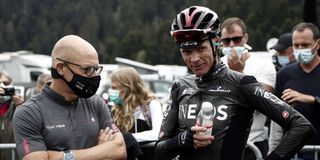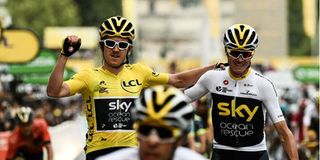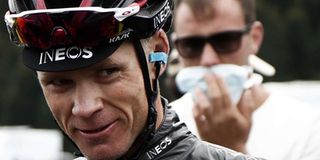Premium
'Impossible' is a word that does not exist in Froome’s cycling road of success

Britain's Chris Froome (right) and general manager Dave Brailsford (left) of Team Ineos speak together at the end of the 3rd stage of the La Route d'Occitanie cycling race between Saint-Gaudens and Col de Beyrede, on August 3, 2020.
What you need to know:
- The news last week that he had not been named in the Ineos team for the Tour that begins on Saturday in Nice, was just as big as it would have been, had he made the team.
- Everybody was waiting for this racing super star, easily the best cyclist, certainly the biggest name of the sport this last decade, to have another stab at greatness.
Four-time Tour de France winner Chris Froome is your ordinary kind of guy, but not quite.
His childhood and how he got involved in professional cycling give indications of what kind of man the British-Kenyan really is.
Born in Kenya 35 years ago, he confesses in multiple media interviews he was never really interested in becoming a professional bicycle racer as a child, that he used to ride the two-wheeled contraption primarily for transport, and also just to fool around with show-off tricks we used to call “wheelie” – riding on one wheel, “scramble” – stopping hard with a back wheel skid, “free-hands” – cycling without holding the handle bars, and the like, somewhere in Muguga, Kiambu County.

In this file photo taken on July 29, 2018, Tour de France 2018 winner Great Britain's Geraint Thomas (left), wearing the overall leader's yellow jersey, shakes hands with third-placed Great Britain's Christopher Froome on the podium after the 21st and last stage of the 105th edition of the Tour de France cycling race between Houilles and Paris Champs-Elysees.
He only got engaged in serious bike racing when he went to South Africa as a teenager for his secondary school education.
In Kenya he had participated in several amateur races against older boys under his childhood mentor and former Kenya team cycling captain David Kinjah.
The story of how he registered for the 2006 UCI Road World Championships in Salzburg, Austria is a familiar one. According to Froome, the chairman of Kenya Cycling Federation Julius Mwangi had given him the password to the federation email account to use in helping reply to mails.
Determined to compete at a high level and increase his chances of getting a pro contract, Froome surreptitiously used the password to register for the championship knowing the federation was unlikely to put any Kenyan in the race.

British four-time winner Chris Froome arrives on stage during the official presentation of the next Tour de France 2020 cycling race on October 15, 2019 in Paris.
He travelled to Salzburg as the sole Kenyan representative, attending the team managers’ briefing on behalf of himself.
Despite crashing at the start of the road trial he finished 17th, and 25th in the road race to catch the attention of the professional cycling world. He also won a bronze for Kenya at the 2007 All Africa Games.
“Froomey”, as he is popularly known, consequently got his first professional contract in 2007, signing for Team Konica Minolta, a South African outfit.
The following year, he moved to Barloworld, a British registered team sponsored by a South African company until 2010 when he got his big break. He joined Grand Tour-conquering Team Sky as he switched his nationality to British.

In this file photograph taken on July 29, 2018, Tour de France winner Great Britain's Geraint Thomas (left) wearing the overall leader's yellow jersey and classification third-placed Great Britain's Christopher Froome (centre) react as they cross the finish line of 21st and last stage of the 105th edition of the Tour de France cycling race between Houilles and Paris Champs-Elysees.
He went on to win four Tour de France titles (2013, 2015, 2016, 2017), one Giro d’Italia (2018) and two Vuelta a Espana (2011, 2017) titles in addition to two Olympic gold medals (2012, 2016), and one World Championship individual bronze medal (2017).
The three Tours – raced over three weeks – are the most prestigious stage races in professional cycling.
He cemented his greatness when he won the 2018 Giro d’Italia, to become the first rider since 1983 to hold all three Grand Tour titles at the same time and only the seventh man to achieve a career Grand Tour grand slam.
Not satisfied with this apotheosis, Froome was targeting a record equalling fifth Tour de France win in 2018 when he got involved in a horrific accident at the Criterium du Dauphiné race in France in July last year.

Britain's Chris Froome of Team Ineos looks on after competing in the 3rd stage of the La Route d'Occitanie cycling race between Saint-Gaudens and Col de Beyrede, on August 3, 2020.
He broke his neck vertebra, right femur, elbow, hip, ribs and sternum. Certainly a career ending injury for any athlete.
Not Froome. Just weeks after the crash, he was already pedalling a stationary bike, eager to rejoin the peloton.
No sooner had he been given the go ahead to start training on the road again than he was back sitting on the familiar saddle, holding the handle bars and speeding away. He shared this images with his 1.5 million Twitter followers.
In January, he joined a Team Ineos (formerly Team Sky) training camp and a month later competed in the Covid-19-shortened UAE Tour.
He declared he was targeting a fifth title at this year’s Tour de France and demonstrated just how far he had come from his serious injuries with some gutsy riding in three races -- La Route d’Occitanie, Tour de I’Ain and Criterium du Duaphine – in France earlier this month.
The news last week that he had not been named in the Ineos team for the Tour that begins on Saturday in Nice, was just as big as it would have been, had he been included.
Haters and admirers alike, were waiting for this racing superstar, easily the best cyclist, certainly the biggest name of the sport this last decade, to have another stab at greatness. It is a rousing tale in itself.
However, just the fact that he was racing professionally after his horrendous injuries a year ago is a true comeback story.
Winning a fifth Tour, perhaps next year, could well be -- from my book, the greatest comeback in sports history.
And I would love to see him silence his detractors who wonder how Africa could produce such an accomplished cycling world beater; who question how an athlete can thrive so late in his career; and who bristle at how this boy from nowhere has so dominated the top echelons of the sport.
Some have even written him off!
They should know Froome. In an interview with retired F1 Mercedes driver Nico Rosberg last year, he said: “In professional sport nothing is given to you for free. You have to work extremely hard. You need luck, but you also have to make your own luck.”
Good luck in the Vuelta this year Froomey, and next year as you chase your fifth Tour crown under a new team, Israel Start-Up Nation. With you, it is possible.





